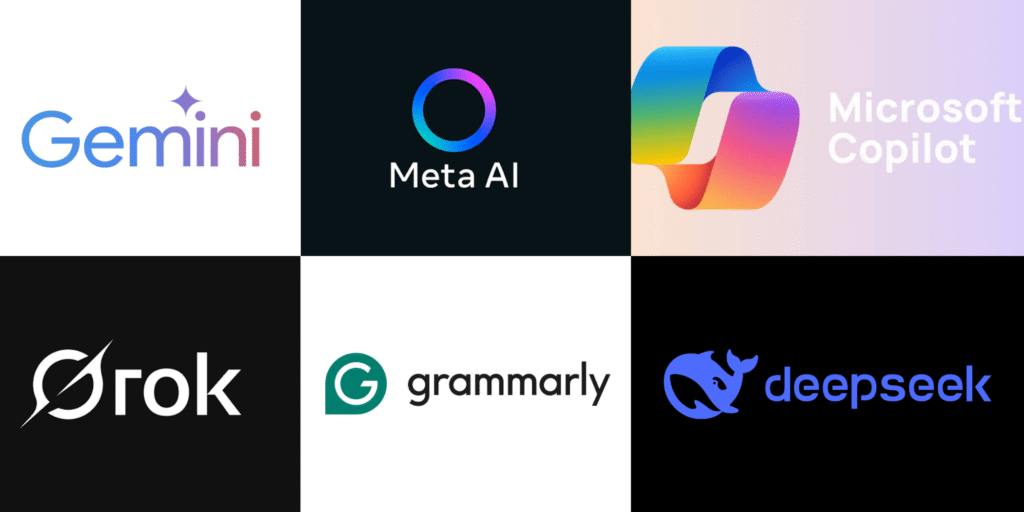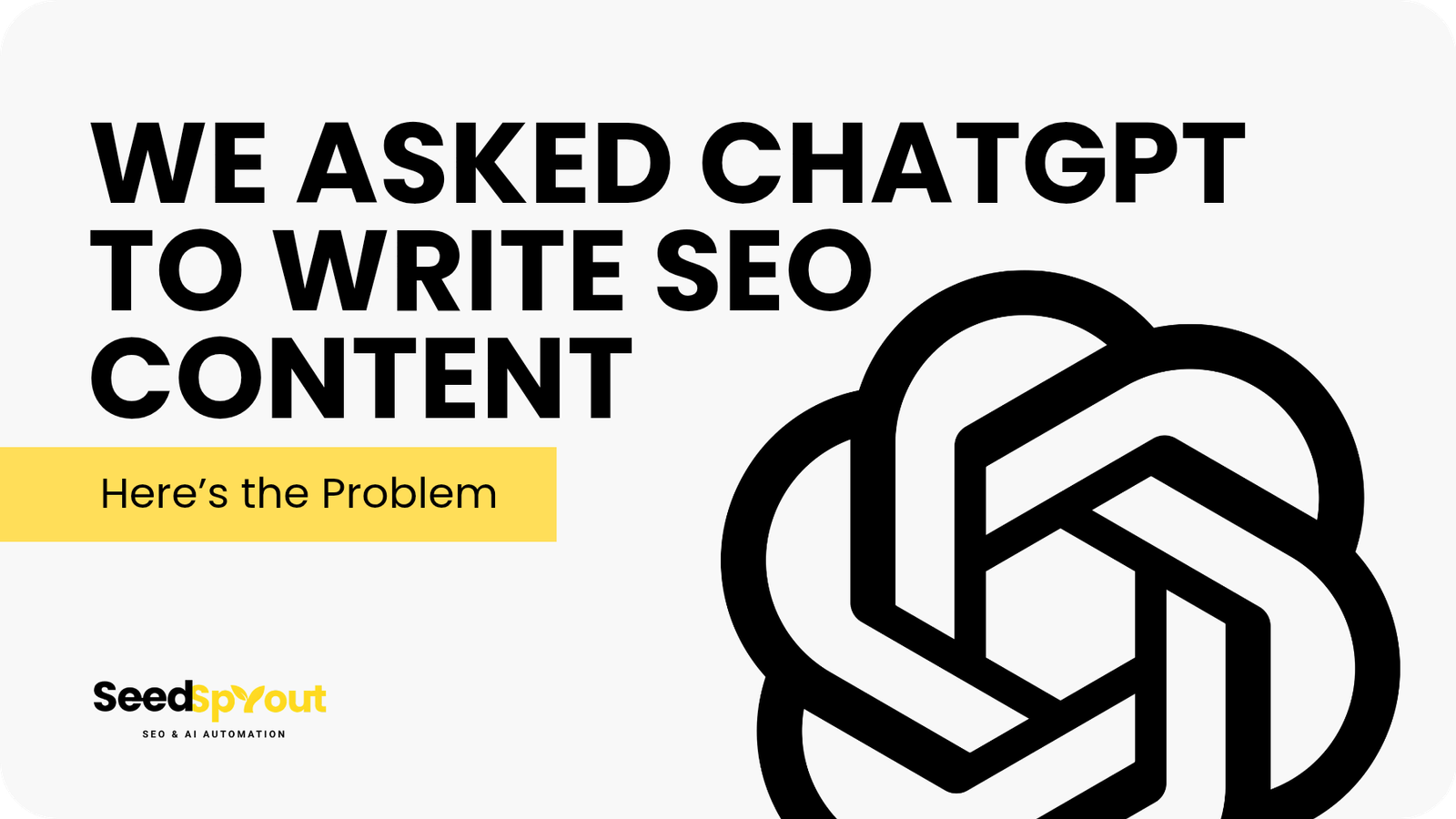We Asked ChatGPT to Write SEO—Here’s the Problem
TL;DR
AI tools like ChatGPT can help with SEO content, but they’re not replacements for human expertise. Google’s 2025 Quality Rater Guidelines specifically flag AI-generated content as “Lowest” quality when it lacks effort, originality, or added value. The solution? Use AI as a research assistant, but always involve human expertise for local insights, brand voice, and strategic direction. This balanced approach helps you avoid Google’s scaled content abuse penalties whilst maintaining authentic, valuable content.
Picture this: It’s 3 AM, your client wants fresh SEO content by morning, and ChatGPT is sitting there like a caffeinated intern ready to churn out 2,000 words in 30 seconds.
Tempting, right?
Everyone’s obsessed with using AI for SEO. Business owners are asking their expert SEO manager: “Can’t we just use ChatGPT for everything?” Marketing teams are wondering if they can replace their entire content strategy with AI. And honestly? We get it.
But here’s the thing—we decided to put this theory to the test.
The Great AI Experiment of 2024
Last month, we asked ChatGPT to write SEO content for a fictional UK-based plumbing company. The brief was simple: “Write SEO-optimised content about emergency plumbing services in Manchester.”
What we got back was… well, let’s just say it wouldn’t fool anyone who actually lives in Manchester.
The AI produced 1,200 words of technically accurate but soulless content. It mentioned “emergency plumbing services” 47 times (yes, we counted), suggested calling a “plumber near you” without any local context, and somehow made burst pipes sound as exciting as watching paint dry.
It was SEO content, technically. But it was also everything wrong with modern AI SEO content.
SeedSprout Insight: 73% of our clients ask about AI content in their first consultation. Most have already tried ChatGPT for SEO and found it… lacking.
AI SEO Problems That Actually Matter
Here’s what Google’s official documentation tells us about AI-generated content—and what we learned from our experiment:
1. The Bland Tone Problem
AI writes like it’s addressing everyone and no one simultaneously.
Our ChatGPT plumbing content sounded like it was written by a robot who’d never seen a leaky tap. No personality, no local flavour, no understanding that Manchester residents might have different concerns than London ones.
Real SEO content needs voice. It needs to sound like it’s written by humans, for humans, about human problems.
2. The Generic Advice Trap
ChatGPT loves generic advice. “Contact a professional plumber.” “Regular maintenance prevents problems.” “Emergency services are available 24/7.”
Groundbreaking stuff, right?
Meanwhile, a proper SEO agency would know that Manchester’s Victorian housing stock has specific plumbing challenges. They’d understand local search patterns, seasonal demand spikes, and what actually makes residents pick up the phone.
3. Missing Local Context
This is where AI falls flat on its digital face.
ChatGPT mentioned “local plumbers” but couldn’t tell you about Manchester’s hard water issues, the area’s typical housing problems, or why emergency calls spike during specific weather patterns.
Local SEO isn’t just about stuffing location keywords. It’s about understanding the community, the geography, the culture. AI doesn’t do pints and proper British banter.
4. The Buzzword Buffet
AI content loves buzzwords more than a startup pitch deck.
Our ChatGPT sample was drowning in “innovative solutions,” “cutting-edge technology,” and “seamless experiences.” For plumbing. In Manchester. At 3 AM.
Real people don’t search for “innovative drain solutions”—they search for “blocked toilet help.”

What Google Actually Says About AI Content
Let’s cut through the speculation with facts from Google’s official documentation:
“Using generative AI tools or other similar tools to generate many pages without adding value for users may violate Google’s spam policy on scaled content abuse.”
— Google’s Search Essentials, 2024
Google’s January 2025 Quality Rater Guidelines update was even more explicit. Quality raters are now instructed to flag AI-generated content as “Lowest” quality when it shows:
- Little to no effort in creation
- Little to no originality
- Little to no added value for visitors
The guidelines specifically mention that content should earn a “Lowest” rating if it’s “auto or AI generated” without substantial human input.
The March 2024 Wake-Up Call
Google’s March 2024 core update was massive—the largest ever, according to Google. It specifically targeted low-quality AI content and scaled content abuse.
Sites that relied heavily on AI-generated content without human oversight saw significant ranking drops. The message was clear: AI content isn’t inherently bad, but lazy AI content gets penalised.
John Mueller’s Take on AI Tools
Google’s John Mueller has been particularly vocal about AI in SEO. In a recent LinkedIn post, he noted that while AI tools can be helpful in work, he advises against relying on them for SEO advice because they often learn from “all the bad SEO information” out there.
The key insight? AI is a tool, not a strategy.
Why Human-Led SEO Wins in 2025
Here’s what an expert SEO manager brings that ChatGPT for SEO simply cannot:
Real-World Experience
We’ve seen what actually drives conversions. We know that “emergency plumber Manchester” performs differently than “Manchester emergency plumbing services”—and we know why.
We understand seasonal search patterns, local competitor strategies, and how user behaviour changes based on time of day, weather, and local events.
E-E-A-T That Actually Works
Google’s E-E-A-T (Experience, Expertise, Authoritativeness, Trustworthiness) framework isn’t just about ticking boxes. It’s about demonstrating real knowledge.
An expert SEO manager knows how to weave local expertise into content. They understand which authoritative sources to cite, how to structure content for featured snippets, and how to build topical authority over time.
AI can’t replicate years of hands-on experience or relationships with local businesses and communities.
Strategic Thinking
SEO isn’t just about creating content—it’s about creating the right content at the right time for the right audience.
We analyse competitor gaps, identify content opportunities, and develop strategies that actually move the needle. We know when to optimise for featured snippets, when to focus on local pack results, and how to balance short-term wins with long-term authority building.
Want to see how this applies to the newest search features? Check our guide on how to rank in Google AI Overview in 2025—it’s based on real data from our client campaigns.
The Smart Way to Use AI in SEO
Here’s our verdict: AI isn’t the enemy, but it’s not your SEO saviour either.
The sweet spot? Use AI as a research assistant and outline generator, but always involve human expertise for the final product.
The Perfect AI Prompt for SEO Content
Instead of asking AI to write finished content, try this approach:
“Create a detailed outline for a blog post about [topic] targeting [audience] in [location]. Include sections for:
– Local statistics I need to research
– Expert quotes I need to gather
– Case studies I need to develop
– Technical details I need to verify
– Industry-specific insights I need to add
Mark each section with [HUMAN INPUT REQUIRED] and specify what research or expertise is needed.”
This approach gives you structure and saves time, but keeps humans in control of the actual value creation.
The Human-AI Collaboration Framework
Here’s how we use AI effectively:
- Research phase: AI helps identify related topics, competitor gaps, and keyword variations
- Structure phase: AI creates outlines and suggests content organisation
- Draft phase: Humans write the actual content, adding local insights and brand voice
- Optimisation phase: AI helps identify technical SEO opportunities, humans implement strategy
This approach lets you work faster without sacrificing quality or risking Google penalties.
The Bottom Line: AI vs Human SEO
| Aspect | ChatGPT Alone | SeedSprout Human + AI |
|---|---|---|
| Local Knowledge | Generic location mentions | Deep local insights and community understanding |
| Brand Voice | Robotic, one-size-fits-all | Authentic, tailored to audience |
| Strategic Thinking | Tactical content creation | Comprehensive SEO strategy |
| E-E-A-T Signals | Superficial expertise claims | Genuine experience and authority |
| Google Compliance | Risk of scaled content penalties | Aligned with Google’s quality guidelines |
| Time to Results | Fast content, slow rankings | Sustainable, long-term growth |
Verdict: AI is a brilliant research assistant, but it’s not an SEO manager. Use it to speed up your process, not replace your brain.
Ready to See the SeedSprout Difference?
Tired of AI-generated content that sounds like everyone else’s? Want SEO that actually understands your local market and drives real results?
Get your free SEO audit and see how human expertise can transform your search visibility. We’ll show you exactly where AI content is holding you back and how to fix it.
Because when it comes to SEO, there’s no substitute for experience.
Frequently Asked Questions
Google doesn’t penalise AI content specifically, but it does penalise low-quality content that lacks value. The January 2025 Quality Rater Guidelines explicitly flag AI content as “Lowest” quality when it shows little effort, originality, or added value. The key is ensuring AI content meets Google’s helpful content standards.
Yes, but with caveats. ChatGPT works best as a research assistant and outline generator, not as a complete content creator. Always add human expertise, local insights, and brand voice to avoid Google’s scaled content abuse penalties. The most effective approach combines AI efficiency with human strategic thinking.
AI content tends to be generic, lacks local context, and misses nuanced user intent. Human-created SEO content includes local knowledge, brand voice, strategic thinking, and genuine expertise. Human content better satisfies Google’s E-E-A-T requirements and drives higher engagement rates.
Warning signs include: generic language, lack of local specificity, overuse of buzzwords, missing brand personality, and content that could apply to any business in any location. If your content sounds like it could be about anyone, anywhere, it’s probably too AI-reliant.
Use AI for research, outline creation, and technical analysis, but keep humans in control of strategy, content creation, and optimisation. The most successful approach involves AI handling data processing and initial research, while humans provide expertise, local knowledge, and strategic direction.
“AI can write content, but it takes humans to create connections.”




